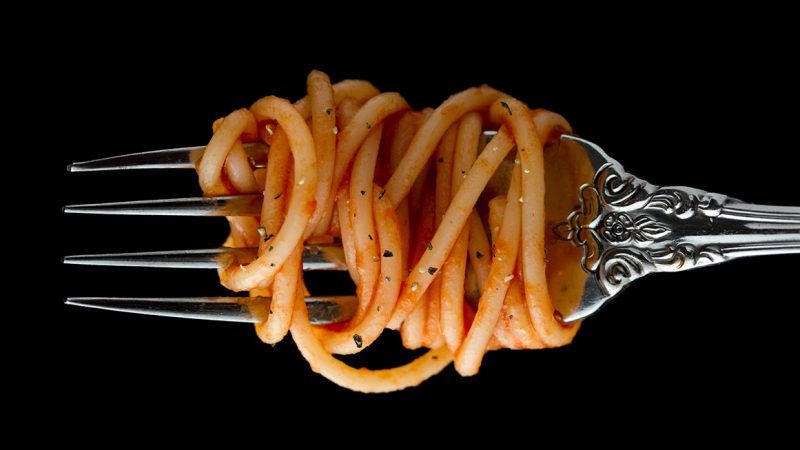The FDA Stole Your Bucatini
Instead of blocking food imports during a pandemic in which supply chains are strained, the FDA should allow consumers to choose food that will fill them up.

Any pasta enthusiast worth her salt will tell you that bucatini—which is like spaghetti but thicker, and with a hole in the middle—is the gold standard of deliciousness, unrivaled in texture and taste. So naturally, the Food and Drug Administration (FDA) felt the need to ruin consumers' bucatini bliss.
The absence of bucatini on store shelves since about April 2020 should be attributed not to the COVID-19 pandemic and related supply chain disruptions but rather to an FDA rule mandating that all pasta contain 13–16.5 milligrams of iron per pound, reported Grub Street.* Imports of De Cecco's bucatini have been stopped at the border since March 30 due to the FDA's discovery that the massive pasta company's product contained only 10.9 milligrams of iron per pound. (Typically, customers would also be able to buy from De Cecco competitor Barilla, but that company cut back production of bucatini during the pandemic.) Although the pasta variety remains legal to import and sell in other countries, U.S. consumers have been left in the lurch as the company attempts to iron out this regulatory wrinkle.
Iron deficiency is a real problem for some Americans, but insufficiently fortified pasta is not the culprit, especially not when abundant sources of nutritional iron can be found throughout the average American grocery store. The fact that the FDA chose to bar access to a product with some iron, but not enough, means it chose to punish a company (and its customers) for doing insufficient good rather than something bad.
Making a subpar situation worse has been the FDA's forte of late. At the beginning of the coronavirus pandemic, more than 800 distilleries across the country stopped producing spirits and started attempting to meet the ever-growing demand for hand sanitizer; the FDA responded by slapping them with $14,000 fees targeted at drug production facilities. (After reporting by Reason, the fees were lifted.)
The FDA can do a lot of good by simply getting out of the way. Just a few months ago, the agency finally repealed a 1971 regulation of the contents of frozen cherry pie. The rules, which did not apply to other fruit pies or even to unfrozen cherry pies, restricted the number of "blemished" cherries that could be used in a filling.
Instead of blocking food imports during a pandemic in which supply chains are strained, the FDA should allow consumers to choose food that will fill them up while requiring a little more iron from some other item. Our ability to make perfect cacio e pepe and optimal carbonara is suffering as a result of the agency's pointless overreach.
**CORRECTION: The post has been updated to attribute reporting to Grub Street.


Show Comments (42)